On a recent Wednesday, the Trump administration escalated its battle over tariffs by taking the issue to the Supreme Court. The administration requested a swift ruling affirming the president's authority to impose expansive import taxes under federal law.
The government urged the Supreme Court to overturn a previous appeals court ruling that deemed most of Trump's tariffs as an illegal application of an emergency powers law. This legal move highlights the administration's intention to preserve what it views as a critical component of its trade policy.
Recently, the U.S. Court of Appeals for the Federal Circuit maintained the tariffs for the time being; however, the Trump administration moved quickly to seek intervention from the Supreme Court. Solicitor General D. John Sauer urged the justices to address the case and schedule arguments for early November, claiming the ongoing judicial uncertainty jeopardizes foreign negotiations Trump is actively pursuing through these tariffs.
Sauer characterized the stakes in this case as significant, stating, “That decision casts a pall of uncertainty upon ongoing foreign negotiations... The stakes in this case could not be higher.” This situation has led to substantial concerns among small businesses that have faced economic struggles due to the tariffs. Jeffrey Schwab, senior counsel and director of litigation at the Liberty Justice Center, emphasized the detrimental impact on small businesses, which have already faced two legal victories against the administration regarding the tariffs.
The lawsuits against the tariffs are among several that have questioned the legality and unpredictable implementation of these trade measures, which have not only unsettled global markets but also strained relations with U.S. allies. Nonetheless, Trump has utilized these tariffs to leverage negotiations with major entities such as the European Union and Japan. By late August, revenue from these tariffs reached approximately $159 billion, more than double the amount from the previous year.
The U.S. Court of Appeals for the Federal Circuit had a majority opinion stating that the 1977 International Emergency Economic Powers Act (IEEPA) did not permit Trump to override congressional authority in setting tariffs. Conversely, dissenting judges argued that the law grants the president the capability to regulate imports during declared emergencies, thereby supporting Trump's actions.
The tariffs in question encompass two different sets imposed by Trump, both justified under national emergency declarations: the initial tariffs announced in April and additional ones from February targeting imports from Canada, China, and Mexico. While the Constitution assigns the power to impose taxes, including tariffs, to Congress, over the years, this authority has been increasingly delegated to the presidency, a power that Trump has exploited to significant effect.
It is notable that while some tariffs, like those on foreign steel, aluminum, and automobiles, were not addressed in the appeals court ruling, other tariffs that Trump implemented during his first term on China were retained by the Biden administration. The administration asserts that if these tariffs are invalidated, it may need to refund a substantial amount of the collected import taxes, a scenario that would adversely affect the U.S. Treasury.
As this legal struggle progresses, the implications of the Supreme Court's upcoming decisions could have lasting consequences on both domestic businesses and international trade relations.












